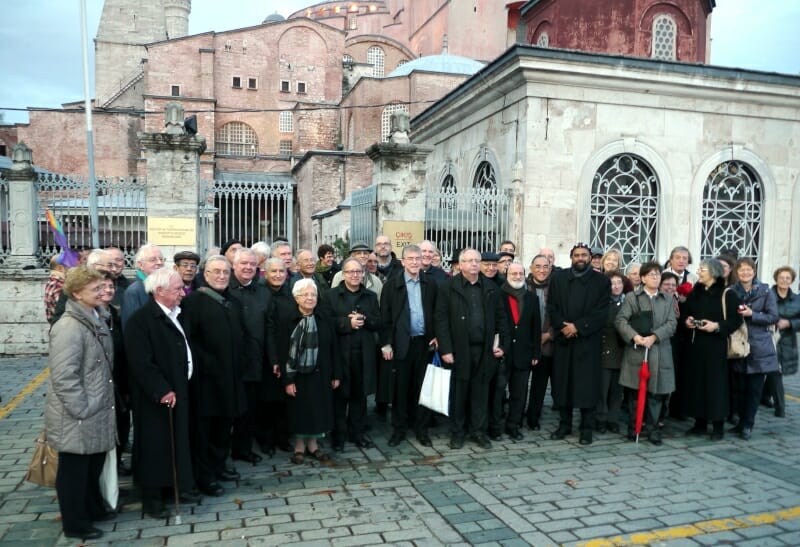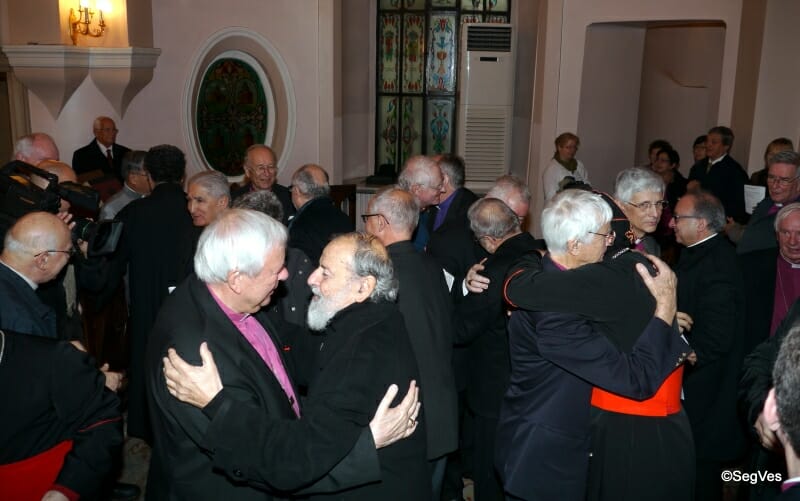


Awaiting Christmas
 “We often have the tendency, due to the language we use, to have an inexact notion of what happened in Nazareth when the angel relayed to the Holy Virgin that the Word had become flesh. An anthropomorphic mentality makes us think of God as a distant person up there in the heavens, who sends his Son to a far-off place to become man. It is not so. God is everywhere. He is in heaven, on earth and in every place. God was thus in the little room of the Virgin in Nazareth, when the angel appeared to her. He was, however, infinitely distant from mankind due to the abyss of sin and because of their natural smallness. The instant in which the Virgin pronounced her ‘fiat,’ God espoused human nature in her pure womb, espoused the creature, and undertook an unimaginable act of bridging the divinity withthe universe. Since then, he is always in our midst. That infinite distance which our imagination expressed, almost placing God far from us, above in the heavens, has been negated: he is on earth, he is our co-citizen.” Pasquale Foresi, Theology of sociality (Teologia della socialità), Città Nuova 1963, p. 66
“We often have the tendency, due to the language we use, to have an inexact notion of what happened in Nazareth when the angel relayed to the Holy Virgin that the Word had become flesh. An anthropomorphic mentality makes us think of God as a distant person up there in the heavens, who sends his Son to a far-off place to become man. It is not so. God is everywhere. He is in heaven, on earth and in every place. God was thus in the little room of the Virgin in Nazareth, when the angel appeared to her. He was, however, infinitely distant from mankind due to the abyss of sin and because of their natural smallness. The instant in which the Virgin pronounced her ‘fiat,’ God espoused human nature in her pure womb, espoused the creature, and undertook an unimaginable act of bridging the divinity withthe universe. Since then, he is always in our midst. That infinite distance which our imagination expressed, almost placing God far from us, above in the heavens, has been negated: he is on earth, he is our co-citizen.” Pasquale Foresi, Theology of sociality (Teologia della socialità), Città Nuova 1963, p. 66
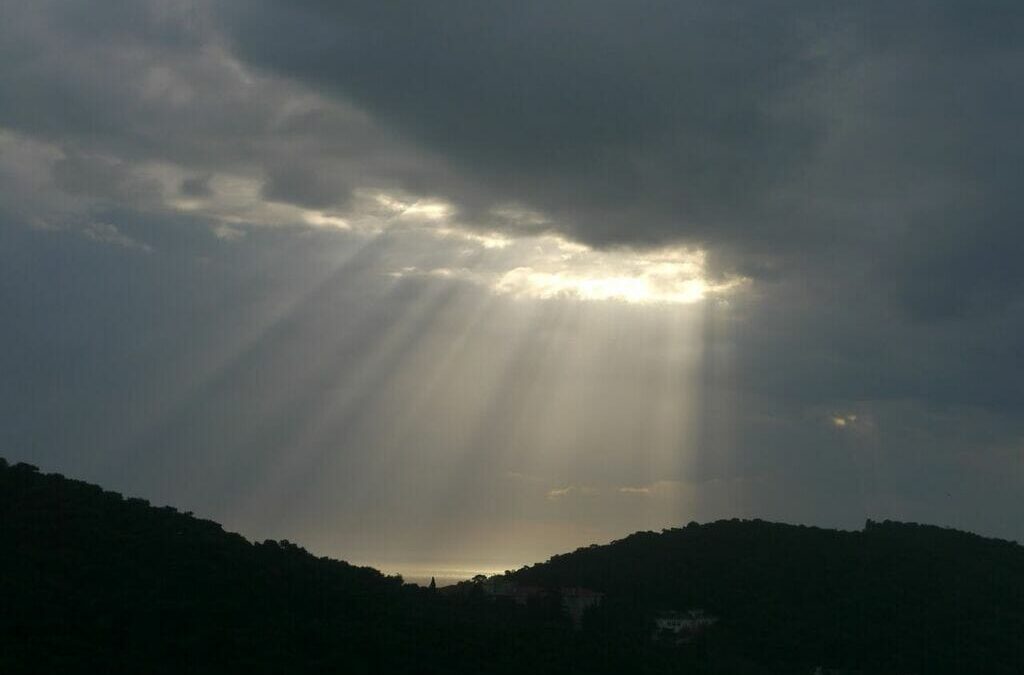
An Appeal for Peace from the Monastery of Halki, Turkey
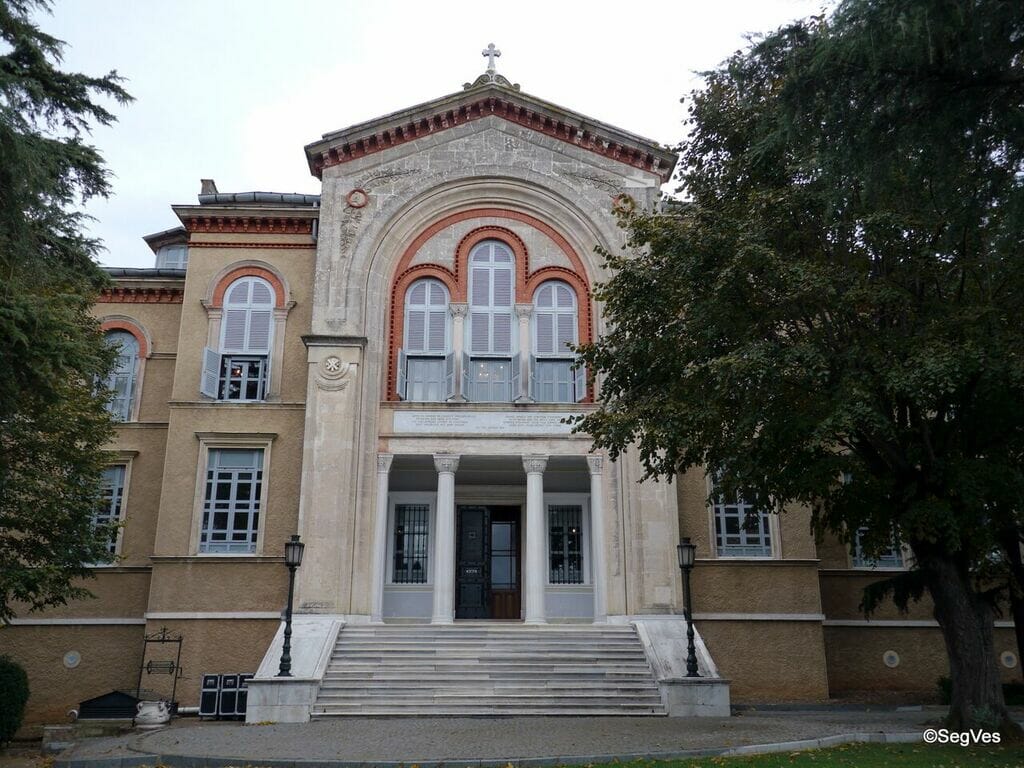 The first part of the Ecumenical Meeting of Bishop Friends of the Focolare concluded on November 27th in the Monastery of the Most Holy Trinity on Halki Island. Cardinal Francis Kriengsak evidenced how the unity amongst the different Christian Churches is at the service of the whole human family. “The diversity is a gift and a mutual enrichment,” he said “but that is possible only by listening without judgement, with the dialogue of life, with the sharing of experiences, with an acceptance that brings the different charisms into harmony.” The challenges and particularities of every church concerning pressing issues are contained in this mutual understanding.
The first part of the Ecumenical Meeting of Bishop Friends of the Focolare concluded on November 27th in the Monastery of the Most Holy Trinity on Halki Island. Cardinal Francis Kriengsak evidenced how the unity amongst the different Christian Churches is at the service of the whole human family. “The diversity is a gift and a mutual enrichment,” he said “but that is possible only by listening without judgement, with the dialogue of life, with the sharing of experiences, with an acceptance that brings the different charisms into harmony.” The challenges and particularities of every church concerning pressing issues are contained in this mutual understanding. 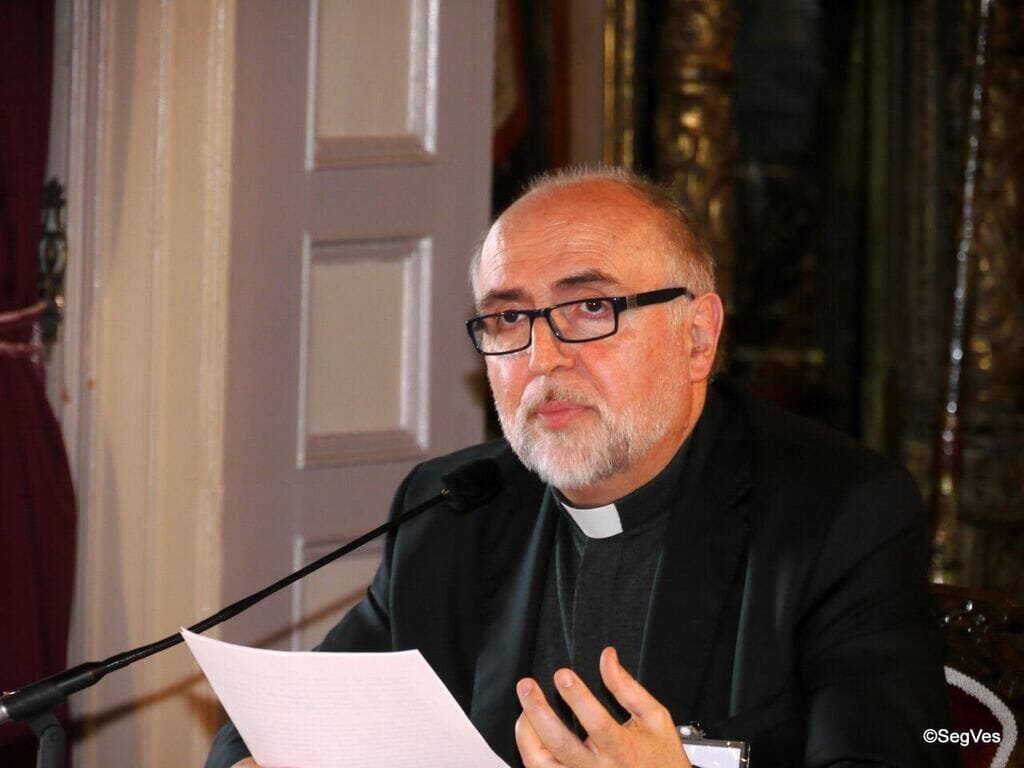 In the morning, Focolare co-president, Jesús Morán, identified several challenges of today’s world, including: globalisation, ultra-modernity, the advent of a piecemeal third world war; and he presented the answers that a culture of unity can give. Quoting from Bishop Klaus Hemmerle, who was a pioneer of the Meeting, he showed the necessity of a listening attitude in today’s world, “Teach me your thought,” Hemmerle would say, “so that I can learn my own proclamation again,” only in this way, claimed Morán, would it be possible to achieve an “inexcusable operation of purification from the religious incrustations” present in our churches. It is these that divide us; the world no longer allows us not only to be disunited, but not even to proclaim the message of Christ as we have up until now. After all, the first Christians did not proclaim a new religion, but a full life, the life they had found in Jesus.” In the dialogue that followed it was clear how deeply those words entered, and there was a strong desire to smooth the way for full and visible communion. Even though the world scene seems to point to the opposite, the co-president invited everyone to hope: “The world as it is today leads me to be more Christian because of this identification with Jesus crucified who permits me to live the deepest Trinitarian communion with my brothers and sisters.” The bishops learned the history of the Monastery of the Most Holy Trinity during their short visit. From 1844 it was a seminary for the formation of Greek Orthodox clergy until 1971 when the Turkey Constitutional Court decided that all private institutes of high education be included in the offer of free public education. The Seminary Council was opposed and the famous school of theology where theologians from around the world studied was closed. In 127 years of activity, 950 students graduated from this school; 330 became bishops; 12 were chosen to be Ecumenical Patriarchs; 2 were elected Patriarchs of Alessandria and 3 from Antioch were ordained priests. The current Abbot of the monastery, Metropolitan Elpidophoros Lambriniadis, gave a presentation titled: “The love of mercy and communion amongst Christians,” an interesting historical reading of the path of dialogue between the Church of the East and the West with a particular mentioning of the role played by Chiara Lubich, foundress of the Focolare, in the rapprochement of the two Churches.
In the morning, Focolare co-president, Jesús Morán, identified several challenges of today’s world, including: globalisation, ultra-modernity, the advent of a piecemeal third world war; and he presented the answers that a culture of unity can give. Quoting from Bishop Klaus Hemmerle, who was a pioneer of the Meeting, he showed the necessity of a listening attitude in today’s world, “Teach me your thought,” Hemmerle would say, “so that I can learn my own proclamation again,” only in this way, claimed Morán, would it be possible to achieve an “inexcusable operation of purification from the religious incrustations” present in our churches. It is these that divide us; the world no longer allows us not only to be disunited, but not even to proclaim the message of Christ as we have up until now. After all, the first Christians did not proclaim a new religion, but a full life, the life they had found in Jesus.” In the dialogue that followed it was clear how deeply those words entered, and there was a strong desire to smooth the way for full and visible communion. Even though the world scene seems to point to the opposite, the co-president invited everyone to hope: “The world as it is today leads me to be more Christian because of this identification with Jesus crucified who permits me to live the deepest Trinitarian communion with my brothers and sisters.” The bishops learned the history of the Monastery of the Most Holy Trinity during their short visit. From 1844 it was a seminary for the formation of Greek Orthodox clergy until 1971 when the Turkey Constitutional Court decided that all private institutes of high education be included in the offer of free public education. The Seminary Council was opposed and the famous school of theology where theologians from around the world studied was closed. In 127 years of activity, 950 students graduated from this school; 330 became bishops; 12 were chosen to be Ecumenical Patriarchs; 2 were elected Patriarchs of Alessandria and 3 from Antioch were ordained priests. The current Abbot of the monastery, Metropolitan Elpidophoros Lambriniadis, gave a presentation titled: “The love of mercy and communion amongst Christians,” an interesting historical reading of the path of dialogue between the Church of the East and the West with a particular mentioning of the role played by Chiara Lubich, foundress of the Focolare, in the rapprochement of the two Churches. 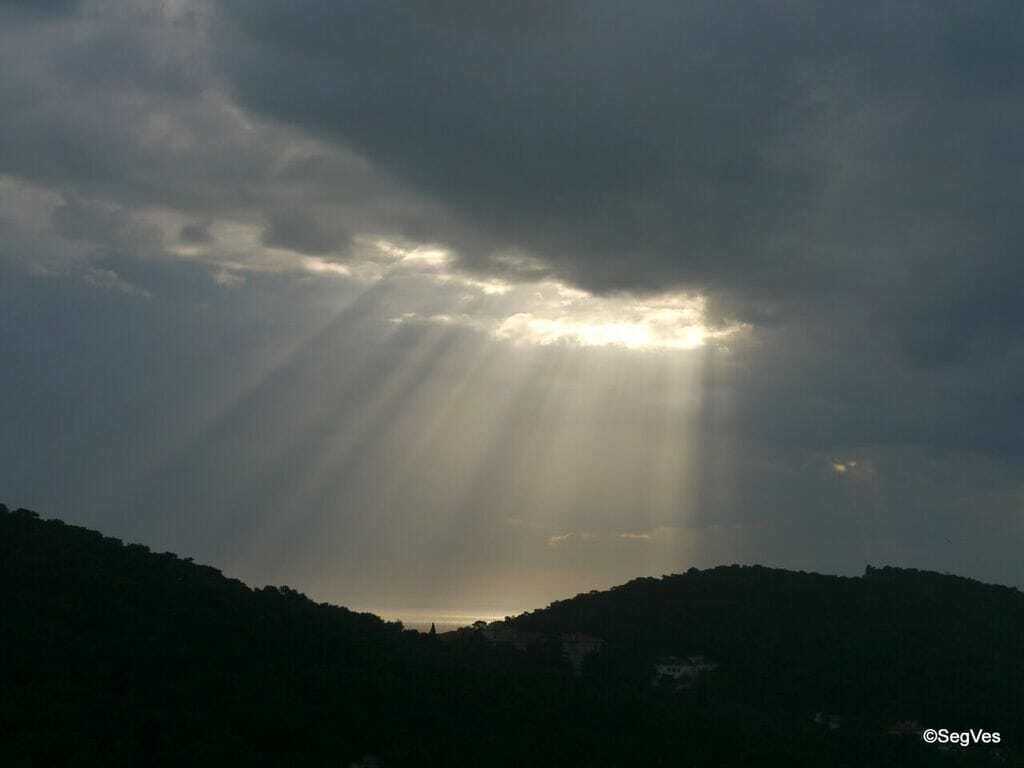 At the conclusion of the first part of the Meeting, the bishops embraced the appeal of Patriarch Bartholomew I, to pray that the School of Theology might be reopened. They also called for the return of the two bishops in Syria, who were kidnapped in April 2013: Greek Orthodox Bishop of Aleppo, Paul Yazigi, and Syro-Orthodox Archbishop Gregorios Yohanna Ibrahim, Bishop Friend of the Focolare and faithful participant at all their gatherings. Now the evening has come and rain is falling lightly on the island. The carts are rolling down the hills carrying a much lighter cargo: brother bishops who are committed to living mutual love so that the Risen Jesus can give his light to the world again. Compiled by: Adriana Avellaneda
At the conclusion of the first part of the Meeting, the bishops embraced the appeal of Patriarch Bartholomew I, to pray that the School of Theology might be reopened. They also called for the return of the two bishops in Syria, who were kidnapped in April 2013: Greek Orthodox Bishop of Aleppo, Paul Yazigi, and Syro-Orthodox Archbishop Gregorios Yohanna Ibrahim, Bishop Friend of the Focolare and faithful participant at all their gatherings. Now the evening has come and rain is falling lightly on the island. The carts are rolling down the hills carrying a much lighter cargo: brother bishops who are committed to living mutual love so that the Risen Jesus can give his light to the world again. Compiled by: Adriana Avellaneda
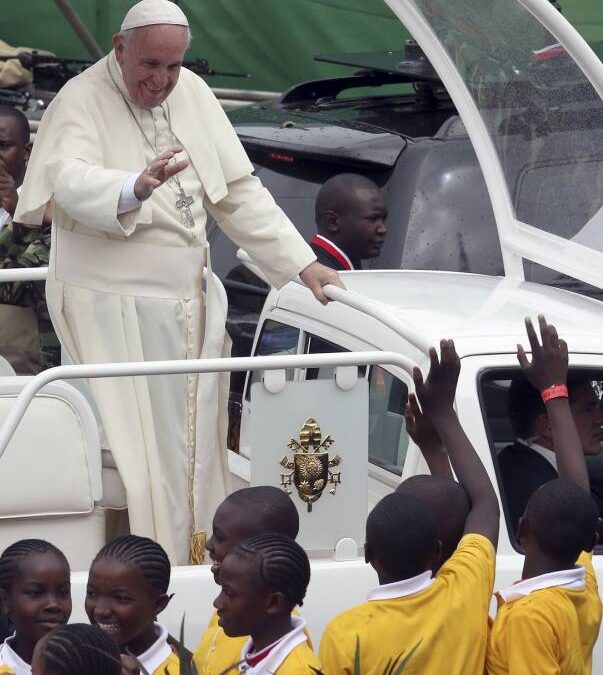
Kenya, first leg of Pope Francis’s African journey
“Karibu Kenya Papa” (Wel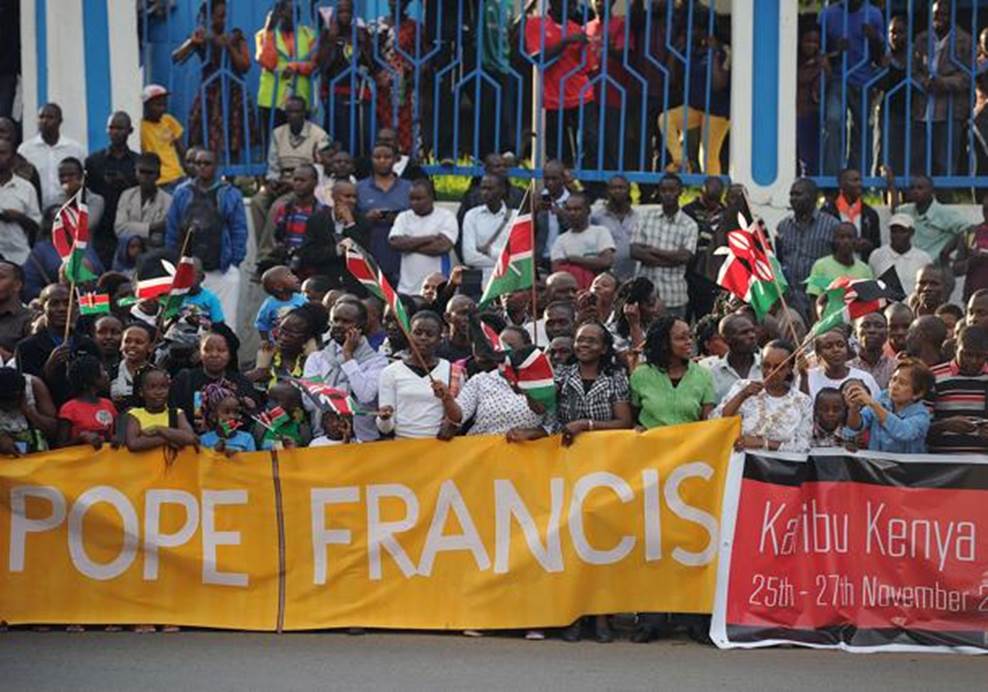 come to Kenya, Pope). Amid festive songs and dances, the Pope landed in Nairobi in the afternoon of 25 November for the first leg in Africa. From the airport and all the way to the city, two waves of crowds accompanied the papal automobile: a simple grey car. In his first greeting Francesco expressed his love for this “young and vigorous nation, a community enriched by diversity.” “Kenya has been blessed, not only with immense beauty in its mountains, rivers, lakes, forests, savannahs and semi-deserts, but also with an abundance of natural resources.” He went on to say: “In a world that continues to exploit instead of protecting our common home,” I hope that your values inspire “the endeavours of the government in promoting models of responsible economic development.” The papal agenda is full: the meeting with the clergy, to whom he gives three key words, weep, pray, and serve; and the session with the UN representatives of Nairobi, from whom he asked for a ”change of direction” so that economy and politics could be placed at the service of the person, in order to eradicate malaria and tuberculosis, be persistent in fighting against deforestation, and target fair trade and development which takes the poor into account. The meeting with the leaders of the various Churches and Muslim and Animist communities was highly significant, and where he affirmed that ecumenical and interreligious dialogue is not a luxury or an option. He then strongly stressed that phrase which echoed throughout the world: “The holy name of God must never be used to justify hatred and violence.”
come to Kenya, Pope). Amid festive songs and dances, the Pope landed in Nairobi in the afternoon of 25 November for the first leg in Africa. From the airport and all the way to the city, two waves of crowds accompanied the papal automobile: a simple grey car. In his first greeting Francesco expressed his love for this “young and vigorous nation, a community enriched by diversity.” “Kenya has been blessed, not only with immense beauty in its mountains, rivers, lakes, forests, savannahs and semi-deserts, but also with an abundance of natural resources.” He went on to say: “In a world that continues to exploit instead of protecting our common home,” I hope that your values inspire “the endeavours of the government in promoting models of responsible economic development.” The papal agenda is full: the meeting with the clergy, to whom he gives three key words, weep, pray, and serve; and the session with the UN representatives of Nairobi, from whom he asked for a ”change of direction” so that economy and politics could be placed at the service of the person, in order to eradicate malaria and tuberculosis, be persistent in fighting against deforestation, and target fair trade and development which takes the poor into account. The meeting with the leaders of the various Churches and Muslim and Animist communities was highly significant, and where he affirmed that ecumenical and interreligious dialogue is not a luxury or an option. He then strongly stressed that phrase which echoed throughout the world: “The holy name of God must never be used to justify hatred and violence.” 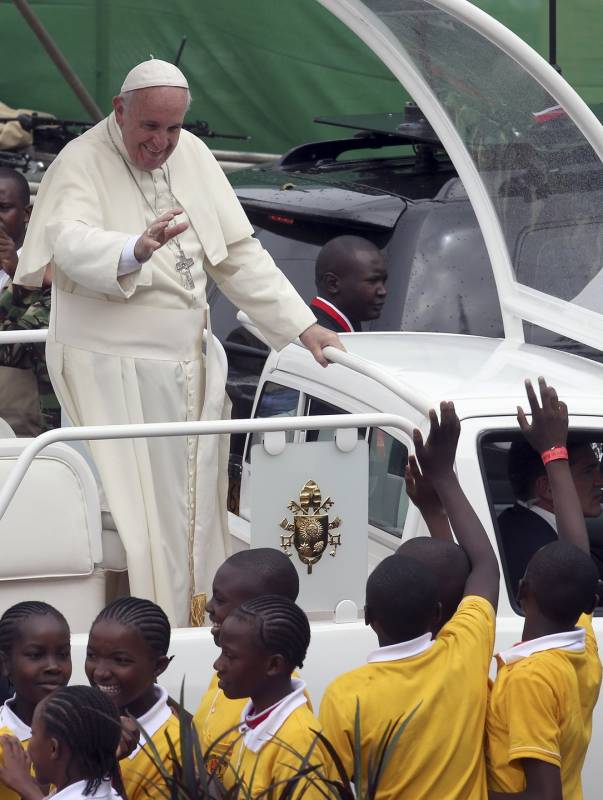 On the 27th, the last day in Nairobi, he went to Kangemi, a very poor shanty town where conditions of human and environmental downgrade have amassed, and which had specifically pushed him to denounce this situation of Kangemi before the UN. He was met there by 100,000 people who waited to welcome him with dances and songs. And Francis did not disappoint them: “I feel at home,” he said. “I share this moment with you brothers and sisters who have a special place in my life and in my choices. I feel your sufferings deeply. I know the pain you bear. How can we not denounce the injustice suffered?” Before leaving for Uganda, he met the youth in the Kasarani stadium to answer all their questions, such as: how to overcome tribalism, corruption, and enrolment of the youth. “Overcoming tribalism – he replied – is a daily task, a job for one’s ears in listening to the others, a task for the heart in opening it to the others, and a labour of the hand in reaching out towards one another.” He added that, “Corruption is something that creeps into our hearts like sugar which is sweet, pleasant, and easy to take, but then we end up in trouble.” And how can radicalisation be overcome? “The first thing we must do to prevent the enrolment of a young person is to offer education and employment.” Each of his meetings overflows with affection, closeness and love. And the people responded with gratitude, joy, and hope. Inculturation of the Gospel is one of the most important challenges in these lands and we must take into account the aspects perceived as values that pre-existed before Christianity: the vision of the family, the role of the clans, tribes, polygamy, and that of the Muslims, etc. It is a challenge which also the Focolare has faced ever since it came to Africa in the 1960s, and which it continues to sincerely undertake with the people of the place, in the spirit of reciprocity. A journey led Chiara Lubich in 1992 to found, precisely in Nairobi, a little town of witness, where specific inculturation courses are held. The next one will be held in May 2016, with the participation also of Maria Voce and Jesús Morán, President and Co-President, respectively. Watch video of the foundation of Mariapolis Piero
On the 27th, the last day in Nairobi, he went to Kangemi, a very poor shanty town where conditions of human and environmental downgrade have amassed, and which had specifically pushed him to denounce this situation of Kangemi before the UN. He was met there by 100,000 people who waited to welcome him with dances and songs. And Francis did not disappoint them: “I feel at home,” he said. “I share this moment with you brothers and sisters who have a special place in my life and in my choices. I feel your sufferings deeply. I know the pain you bear. How can we not denounce the injustice suffered?” Before leaving for Uganda, he met the youth in the Kasarani stadium to answer all their questions, such as: how to overcome tribalism, corruption, and enrolment of the youth. “Overcoming tribalism – he replied – is a daily task, a job for one’s ears in listening to the others, a task for the heart in opening it to the others, and a labour of the hand in reaching out towards one another.” He added that, “Corruption is something that creeps into our hearts like sugar which is sweet, pleasant, and easy to take, but then we end up in trouble.” And how can radicalisation be overcome? “The first thing we must do to prevent the enrolment of a young person is to offer education and employment.” Each of his meetings overflows with affection, closeness and love. And the people responded with gratitude, joy, and hope. Inculturation of the Gospel is one of the most important challenges in these lands and we must take into account the aspects perceived as values that pre-existed before Christianity: the vision of the family, the role of the clans, tribes, polygamy, and that of the Muslims, etc. It is a challenge which also the Focolare has faced ever since it came to Africa in the 1960s, and which it continues to sincerely undertake with the people of the place, in the spirit of reciprocity. A journey led Chiara Lubich in 1992 to found, precisely in Nairobi, a little town of witness, where specific inculturation courses are held. The next one will be held in May 2016, with the participation also of Maria Voce and Jesús Morán, President and Co-President, respectively. Watch video of the foundation of Mariapolis Piero
Nairobi, May 19, 1992: Inauguration of “Mariapolis Piero” in Kenya
Word of Life December 2015
We are offered the possibility of meeting Jesus in our daily lives and among us. If we take it, we will experience a living Christmas. The words are spoken to me. The Lord is coming and I must be ready to welcome him. Every day I pray, ‘Come, Lord Jesus.’ And he replies, ‘Yes, I am coming soon’ (see Rev. 22:17, 20). He is standing at the door and knocking. He asks to come in (see Rev. 3:20). I cannot leave him outside my life. The invitation to welcome the Lord came from John the Baptist. It was directed to the Jewish people of his time. They were asked to confess their sins and be converted, changing their lives. He was certain that the coming of the Messiah was about to happen. Would the people, who had been waiting for him for centuries, recognize him, listen his words and follow him? John knew that to welcome him they had to get ready, hence his pressing invitation: ‘Prepare the way of the Lord, make his paths straight.’ These words are spoken to me because Jesus continues to come every day. Every day he knocks at my door and for me too, as for the Jews at the time of the Baptist, it is not easy to recognize him. So, contrary to what was commonly expected, he presented himself as a humble carpenter from Nazareth, an unimportant village. Today he presents himself under the guise of a migrant, someone with no work, an employer, a schoolmate, relatives, even of people who don’t always seem to shine with the face of the Lord, indeed where his face seems hidden. His subtle voice, which invites us to forgive, to give trust and friendship, to refuse to give in to choices against the Gospel, is often drowned out by other voices that incite us to hate, get our own back, become corrupt. This is the basis for the metaphor of tortuous and impenetrable paths that recall the obstacles hindering God’s coming into our everyday lives. It’s almost pointless to list the baseness, the egoism, the sin that dwells in our hearts and makes us blind to his presence and deaf to his voice. Each one of us, if we are sincere, knows what are the personal barriers obstructing our meeting with Jesus, with his word, with the persons with whom he identifies himself. Hence the invitation in the Word of Life that today is spoken directly to me: ‘Prepare the way of the Lord, make his paths straight.’ Correcting that judgement which makes me condemn the other person, ceasing to speak to them, so that instead I come to understand, to love and put myself at the other’s service. Correcting a twisted way of behaving that makes me betray a friendship, makes me violent, cheating civil law, and instead letting myself be converted into a person who is ready even to put up with injustice so as to be able to salvage a relationship, someone willing to pay in person the cost of encouraging fraternity in my neighbourhood. It is hard and a strong word, the one we have this month. But it is also a liberating word, one that can change my life, open me to meeting Jesus, so that he may come to live in me and it be he who acts and loves in me. This word, if it is lived, can do even more. It can give birth to Jesus among us, in the Christian community, in our families, in the groups where we are active. John spoke it to the whole of the people. And God came ‘and lived among us’ (Jn 1:14), in the midst of his people. For this reason we want, by helping one another to straighten the paths of our relationships, to wipe out any kind of distortion there may be between us, and so live out the mercy we are invited to have this year. Like this we will become, together, the home, the family, that is capable of welcoming God. It will be Christmas. Jesus will find an open highway and will be able to stay in our midst. Fabio Ciardi
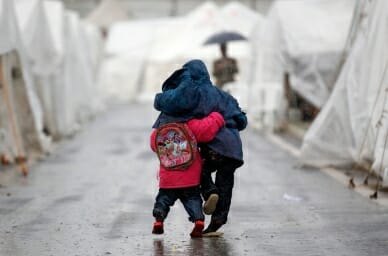
Syria: the ordeal continues
“While the mortar shells are falling near us, fear and worry assail us both for our lives and for the lives of those we know, Christians or Muslims, Syrians or foreigners: our common bond is our humanity, our being brothers and sisters. On the streets of Damascus we live and die together, without distinction.
The death toll of the bombing is tragic: 9 dead and 52 injured. Yet no one speaks of it. For now, Paris has the spotlight. But these are the statistics of the war on the other side of the Mediterranean, these are the statistics of today. I don’t want to intensify the horrifying nature of what is a normal daily reality for everyone. As soon as the din settles, because the noise of the bombs is deafening, I grab my cell phone and call my family and friends: “Are you ok? Where are you? Don’t move! Wait there… .” These are the recurring questions after every bombing or neighborhood shooting. We advise each other to remain where we temporarily found shelter and safety, and there we stay, not knowing where to go. The office, the kitchen, or the hall become shelters or tombs, depending on whether the bombs missed you or hit you. The questions in my head persist, like a mantra: ‘Is it normal to live with this anxiety? Is it normal that people have to live in fear, always? Why does the other side of the world keep silent? How long must this absurdity last? Is it possible that power, money, and profit can defeat the desire for peace common among peoples and communities?’ At the beginning of November, Aleppo remained 15 days without food or supplies, and all access roads were closed. The mines are another of the legacies left by this war. Each transit route must be de-mined before reopening it. A village near Homs was targeted by ISIS and there are about 3,000 displaced persons. The people want the war to end and are full of questions: ‘Who supplies the weapons to this cruel militia? Why do ammunition and explosives arrive, but no food?’ These questions lacerate us, while prayer becomes a balm, our rock. The Christian community seeks to live with a sense of normalcy, meeting for celebrations, working at many solidarity projects, but we are few. People depart inexorably, leaving a beloved homeland because they have no prospects and everything is costly, from medicines to food. But even those who leave want to return: their life is spared, but it isn’t the same as life in Syria, nor the same relationships, nor the same tastes, nor the same complicity. And yet we are not divided. We are scattered, but we continue to live together for the same peace.” Source: Città Nuova
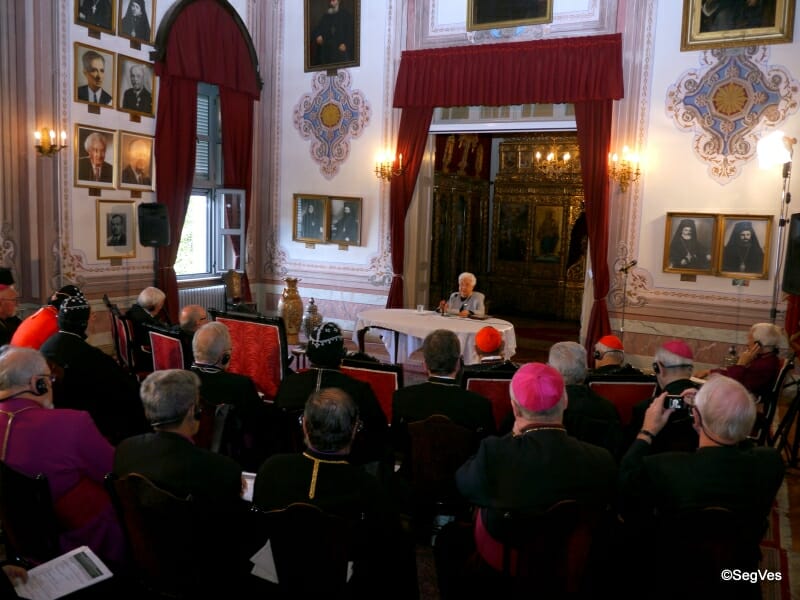
Bishops from various churches: unity is their commitment
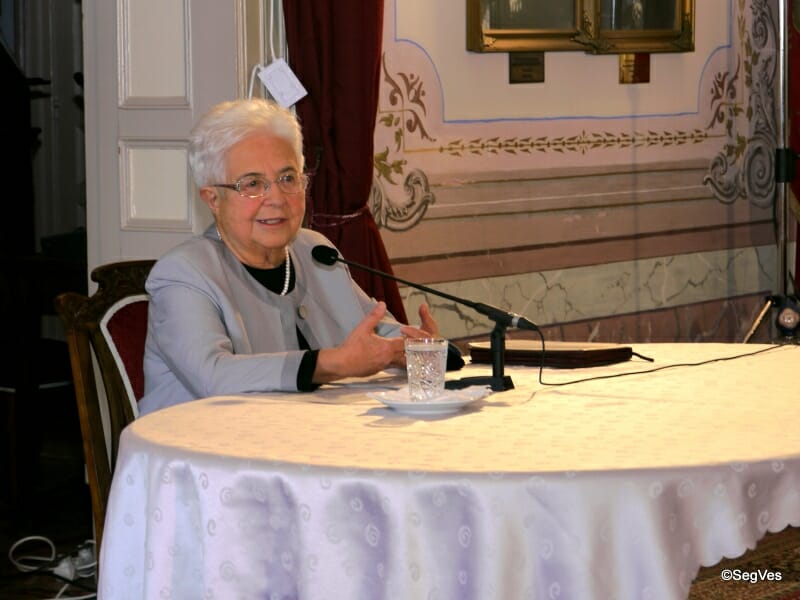 In the present context it may seem absurd or anachronistic to speak of unity. And yet the motivation which animates the bishops present at the Ecumenical Convention on the island of Heybeliada (Halki) is anything but a utopia. Their commitment to live reciprocal love among themselves and with their churches is already a vital testimony for anyone who has lost hope in dialogue and peace. On November 25th, Maria Voce spoke to the bishops about unity in her programmatic speech. Unity is not only a gift from on high, but also becomes an impelling commitment which, she assures us, allows us to “insert ourselves into the sacred history of humanity.” A sacred story in which Christians have an essential role. Unity becomes a response to the challenges of today. “In the face of powerlessness, which at times assails us even today,” she continues, “perhaps we need to take a single first step: to give ourselves to God as instruments in his hands, because he builds unity upon our nothingness. This is our first obligation, the first step we must take singularly and together.” With the dramatic social problems of today, many people, especially the young, feel the need to be visibly present next to those who suffer. But the Focolare Movement’s task does not finish here. One must understand that unity is an objective towards the goal of a united world. “We are called to unity with all, excluding no one,” stresses Maria Voce. Citing various excerpts by Chiara Lubich, she reveals to the bishops the way discovered by the Focolare foundress. “For us, the door which leads to unity is Jesus Crucified and Forsaken,” which “carried out the reunification of the human race with the Father and among men and women, and it is He, crucified and forsaken, the key to unity, which he will fulfill even today.”
In the present context it may seem absurd or anachronistic to speak of unity. And yet the motivation which animates the bishops present at the Ecumenical Convention on the island of Heybeliada (Halki) is anything but a utopia. Their commitment to live reciprocal love among themselves and with their churches is already a vital testimony for anyone who has lost hope in dialogue and peace. On November 25th, Maria Voce spoke to the bishops about unity in her programmatic speech. Unity is not only a gift from on high, but also becomes an impelling commitment which, she assures us, allows us to “insert ourselves into the sacred history of humanity.” A sacred story in which Christians have an essential role. Unity becomes a response to the challenges of today. “In the face of powerlessness, which at times assails us even today,” she continues, “perhaps we need to take a single first step: to give ourselves to God as instruments in his hands, because he builds unity upon our nothingness. This is our first obligation, the first step we must take singularly and together.” With the dramatic social problems of today, many people, especially the young, feel the need to be visibly present next to those who suffer. But the Focolare Movement’s task does not finish here. One must understand that unity is an objective towards the goal of a united world. “We are called to unity with all, excluding no one,” stresses Maria Voce. Citing various excerpts by Chiara Lubich, she reveals to the bishops the way discovered by the Focolare foundress. “For us, the door which leads to unity is Jesus Crucified and Forsaken,” which “carried out the reunification of the human race with the Father and among men and women, and it is He, crucified and forsaken, the key to unity, which he will fulfill even today.”  The task which the Focolare Movement poses is to bring the richness of unity to every corner of the world, to awaken life everywhere. “In the refugee camps, ” continues Maria Voce, “in the hospitals for the wounded by war, in the public demonstrations, in the queues of people looking for work and finding none, in the ports crowded with immigrants…everywhere, everywhere, God is asking us to light ever-greater flames.” In the subsequent dialogue several bishops related their actions in difficult situations, and the solidarity of the faithful of different churches wherever there is war and suffering. They have a strong certainty that the cross of Jesus is the common bond between them and will make lively communities blossom in the most unthinkable places. The program then took a particular look at the situation of the local churches in the Middle East, the role of Christians and their difficulties. Bishop Sahak Maşalyan, despite the complex situation of the Armenian Church in Turkey, spreads optimism, and asserts: “When Christians lose their sense of optimism, in the end they emigrate to some other place.” An appeal was also made by Bishop Simon Atallah, of the Maronite Church of Lebanon. He asked all to pray with fervor to end the war, so that Christians would not abandon their lands and could return to living in peace and harmony. At the end of the day Angela Caliaro e Carmine Donnici, representatives of the Movement, spoke about the development and the influence of the Focolare in the whole Middle Eastern area; a seed of hope which engages Christians, Muslims, and Jews and encourages them to continue on the road to reconciliation and peace. From correspondent Adriana Avellaneda
The task which the Focolare Movement poses is to bring the richness of unity to every corner of the world, to awaken life everywhere. “In the refugee camps, ” continues Maria Voce, “in the hospitals for the wounded by war, in the public demonstrations, in the queues of people looking for work and finding none, in the ports crowded with immigrants…everywhere, everywhere, God is asking us to light ever-greater flames.” In the subsequent dialogue several bishops related their actions in difficult situations, and the solidarity of the faithful of different churches wherever there is war and suffering. They have a strong certainty that the cross of Jesus is the common bond between them and will make lively communities blossom in the most unthinkable places. The program then took a particular look at the situation of the local churches in the Middle East, the role of Christians and their difficulties. Bishop Sahak Maşalyan, despite the complex situation of the Armenian Church in Turkey, spreads optimism, and asserts: “When Christians lose their sense of optimism, in the end they emigrate to some other place.” An appeal was also made by Bishop Simon Atallah, of the Maronite Church of Lebanon. He asked all to pray with fervor to end the war, so that Christians would not abandon their lands and could return to living in peace and harmony. At the end of the day Angela Caliaro e Carmine Donnici, representatives of the Movement, spoke about the development and the influence of the Focolare in the whole Middle Eastern area; a seed of hope which engages Christians, Muslims, and Jews and encourages them to continue on the road to reconciliation and peace. From correspondent Adriana Avellaneda
Turkey. A Wind of Unity on Heybeli Island, Itstanbul.
November 25th, 9 am. A light breeze blows over Heybeli Island, Halki, a small oasis of peace in the Marmara Sea near Istanbul. On the top of the island’s Hill of Hope stands the Orthodox Monastery Aya Triada (Most Holy Trinity) that is hosting this year’s 34th Meeting of Bishops from different Churches, promoted by the Focolare Movement. Founded in the 9th century, the Monastery was destroyed several times by earthquake and fire. The present construction from the 19th century is the site of a prestigious Greek Orthodox Theological Academy that contains a library with valuable ancient manuscripts and a total of 120,000 books. It was quite an unusual scene at the Monastery’s entrance: 35 bishops from 16 Churches and 19 countries in fraternal dialogue. The president and co-president of the Focolare Movement were also among them along with other members of the meeting. Ecumenical Patriarch Bartholomew I comes to the door: “I am happy at being together with you,” he says with simplicity and leads them into the Monastery. He would present the opening address of the Meeting: “Together for the common cause: the unity of the disciples of Christ in the diversity of gifts.”
Cardinal Francis Kriengsak from Bangkok greets the Patriarch on behalf of all and thanks him for having wished to host this year’s Meeting. “Here we are in the heart of Orthodoxy with its ancient Churches and countless martyrs” he says as he introduces the members of the Meeting. The Anglican Primate, Archbishop of Canterbury, Justin Welby sent a message to the gathering: “I continue to consider the Focolare Movement as one of the beacons of hope in our divided world. With its commitment to unity through mutual respect and dialogue, it offers a characteristic path towards reconciliation beyond differences and enmities.” Bartholomew I recalls his recent visit to Loppiano for the honorary doctorate that was conferred upon him by Sophia University Institute. “An encounter,” he says “in which we experienced sincere love, without any ifs or buts. Then he speaks of the Meeting. “How can we manage to harmonise the diversity of charisms of our Churches today with the unity of the disciples of Christ and be typos (model) of unity for the world?” he asks. “Too many times the differences appear to be foundational elements and not charism and this is what we savour every day in the face of the difficulties which the human race lives out as exclusiveness and conflict”
On a global landscape where discouragement, uncertainty and indifference prevail, especially in the recent days, The Patriarch looked to hope. As Christians, he emphasised: “we have to quickly recover the sense of unity as a recapitulation of the gifts [charisms],” the “wealth of the differences. . . to be offered and, in turn, received.” “The unity of the world, the respect for God’s Creation the gift of his love,” he explained, “will be given by the ability to welcome the experience of the other as an enrichment for all, as a path of unity, of respect and of reciprocity,” “free from every type of ideological, political and economic conditioning.” “I arrived here even more happy because I found you waiting for me. . . like a family,” said the Patriarch as he posed a challenge to the bishops and people entrusted to them: if as Christians we will have this experience, “we will truly be ‘salt of the earth’ and the world will begin a profound metamorphosis.” Compiled by: Adriana Avellaneda

